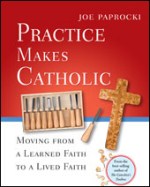
When the topic of adult faith formation comes up, we Catholics have a tendency to immediately shift to a default mode which is the classroom model: there must be a topic, a presenter, and “students.” The topic is usually doctrinal, the presenter is typically the only one who speaks, and the students are passive receptors of the speaker’s wisdom.
More and more parishes are recognizing the reality that adult faith formation must come in many shapes and sizes. I’ve talked here previously about small faith sharing groups and local pilgrimages as forms of adult faith formation that are “outside of the box” in relation to the classroom approach.
Another very effective approach to adult faith formation is a mentoring approach.
This is not a new idea in the Church. The role of the sponsor in the catechumenate and in Confirmation is a mentoring relationship (when done correctly). We need to build on this long tradition in the Church and call people to serve as spiritual mentors for people younger than themselves or people with less experience in the Catholic way of life.
Presently, I’m working with a youth minister at a Chicago parish to establish a mentoring program for the youth in her program. She is blessed to have several hundred youth visiting their parish youth center each month, but she is deeply troubled by the lack of adult involvement in the lives of these teens. In response, we are looking at recruiting a corps of young adults to serve as mentors for the young people. Mentoring is a form of action but, just like the role of catechist, it requires formation and training. It makes sense to combine formation with some sort of action so that formation is not seen simply as something that exists in a vacuum.
 We’ve been looking at some good resources from the National Mentoring Partnership in tandem with my own free mentoring resources for my book Practice Makes Catholic: Moving from a Learned Faith to a Lived Faith:
We’ve been looking at some good resources from the National Mentoring Partnership in tandem with my own free mentoring resources for my book Practice Makes Catholic: Moving from a Learned Faith to a Lived Faith:
- Practice Makes Catholic Online Leader’s Guide (PDF)
- Practice Makes Catholic Online Mentoring Workbook (PDF)
The goal is to connect youth with young adults around Catholic practices, something that will require the adults to reflect on their own understanding of Catholic practices in order to be able to talk with youth about them. In other words, it’s “on-the-job” adult faith formation.





Be the first to comment